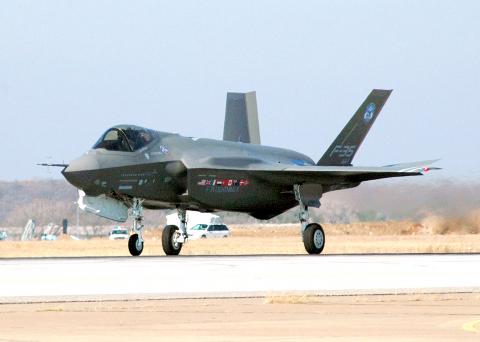F-35 stealth fighters are the new-generation combat aircraft that best serve the nation’s air defense needs, a military official said yesterday, the latest hint that the government might not be as keen to acquire the F-16C/Ds it has been requesting for years.
The F-35s, with their short takeoff capability, would bolster the country’s defense capabilities, since airports are likely to be destroyed by enemy forces in the event of war, the official said on condition of anonymity because of the sensitivity of the issue.
However, the fifth-generation aircraft remains under development and has faced a series of problems and rising costs. Defense analysts are also skeptical as to whether the US would agree to sell F-35s to Taiwan because of fears of possible technological transfer to China.

Photo: AFP / US NAVY
The official’s remarks came after the US House of Representatives voted earlier this month in favor of the US government selling 66 F-16C/Ds to Taiwan to help it close its military gap with China.
Taiwan has long lobbied Washington to sell it the fighters, but US President Barack Obama’s administration decided last year to offer Taiwan a retrofit package for its aging F-16A/B fleet rather than new F-16C/Ds.
Since then, the US Congress has pushed the Obama administration to also sell Taiwan the more advanced fighters, and following the House vote, the Ministry of National Defense issued a statement thanking it for its support.
However, it also said that Taiwan was reassessing its need for more advanced fighters because some of the functions of the upgraded F-16A/Bs were better than those of the F-16C/Ds, and it said that Taiwan, like Japan and Australia, would pursue the purchase of new-generation combat aircraft.
Because Japan and Australia have announced plans to buy F-35s, the statement triggered speculation that Taiwan’s interest in the F-16C/D aircraft had cooled. Asked about the issue, the official said the ministry would make an overall assessment of foreign purchases of military aircraft and make sure the defense budget is well spent.
“There are many options on the table,” the official said. “These include cutting the number of F-16C/Ds we have requested.”
In an interview, Ministry of National Defense spokesman Major General David Lo (羅紹和) reiterated Taiwan’s gratitude for US support and urged Washington to continue selling Taiwan defensive weapons based on the Taiwan Relations Act (TRA).
The TRA, enacted in 1979 when Washington and Taipei severed diplomatic ties, obliges the US to help Taiwan defend itself.
In September last year, the US approved the sale of a retrofit package for F-16A/B aircraft and related training at an estimated cost of US$5.85 billion, which the Executive Yuan has ordered should be brought down to about US$3.7 billion.

ACTION PLAN: Taiwan would expand procurement from the US and encourage more companies to invest in the US to deepen bilateral cooperation, Lai said The government would not impose reciprocal tariffs in retaliation against US levies, President William Lai (賴清德) said yesterday, as he announced five strategies to address the issue, including pledging to increase Taiwanese companies’ investments in the US. Lai has in the past few days met with administrative and national security officials, as well as representatives from various industries, to explore countermeasures after US President Donald Trump on Wednesday last week announced a 32 percent duty on Taiwanese imports. In a video released yesterday evening, Lai said that Taiwan would not retaliate against the US with higher tariffs and Taiwanese companies’ commitments to

Intelligence agents have recorded 510,000 instances of “controversial information” being spread online by the Chinese Communist Party (CCP) so far this year, the National Security Bureau (NSB) said in a report yesterday, as it warned of artificial intelligence (AI) being employed to generate destabilizing misinformation. The bureau submitted a written report to the Legislative Yuan in preparation for National Security Bureau Director-General Tsai Ming-yen’s (蔡明彥) appearance before the Foreign Affairs and National Defense Committee today. The CCP has been using cognitive warfare to divide Taiwanese society by commenting on controversial issues such as Taiwan Semiconductor Manufacturing Co’s (TSMC, 台積電) investments in the

‘SPECIAL CHANNEL’: Taipei’s most important tasks are to stabilize industries affected by Trump’s trade tariffs and keep negotiations with Washington open, a source said National Security Council Secretary-General Joseph Wu (吳釗燮) arrived in the US for talks with US President Donald Trump’s administration, a source familiar with the matter said on Friday. Wu was leading a delegation for a meeting known as the “special channel,” the Financial Times reported earlier. It marked Trump’s first use of the channel since returning to the White House on Jan. 20. Citing a source familiar with the matter, the Financial Times reported that Minister of Foreign Affairs Lin Chia-lung (林佳龍) was also a part of the delegation. The visit came days after China concluded war games around Taiwan and amid Trump’s

HELPING HAND: The steering committee of the National Stabilization Fund is expected to hold a meeting to discuss how and when to utilize the fund to help buffer the sell-off The TAIEX plunged 2,065.87 points, or 9.7 percent, to close at 19,232.35 yesterday, the highest single-day percentage loss on record, as investors braced for US President Donald Trump’s tariffs after an extended holiday weekend. Amid the pessimistic atmosphere, 945 listed companies led by large-cap stocks — including Taiwan Semiconductor Manufacturing Co (TSMC, 台積電), Hon Hai Precision Industry Co (鴻海精密) and Largan Precision Co (大立光) — fell by the daily maximum of 10 percent at the close, Taiwan Stock Exchange data showed. The number of listed companies ending limit-down set a new record, the exchange said. The TAIEX plunged by daily maxiumu in just